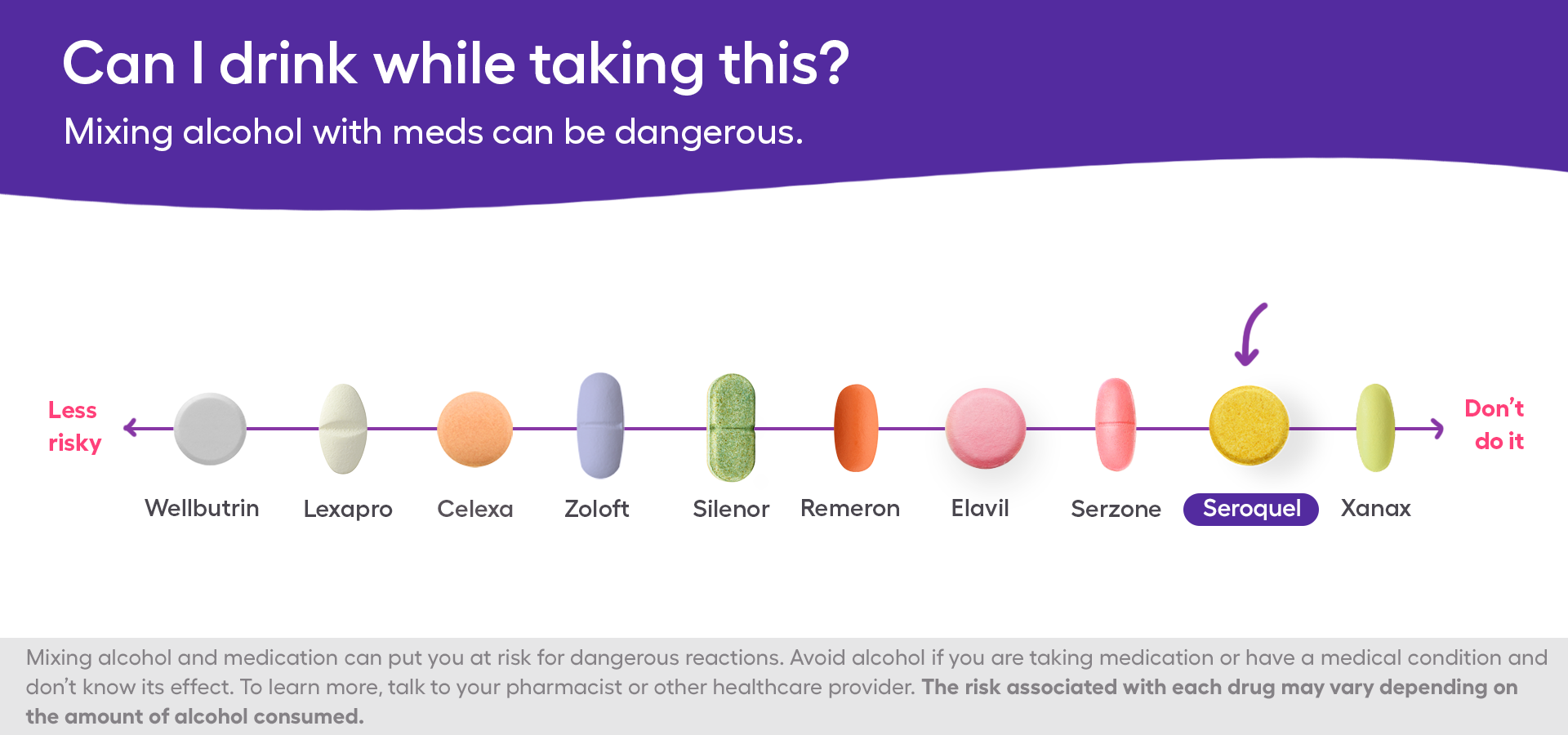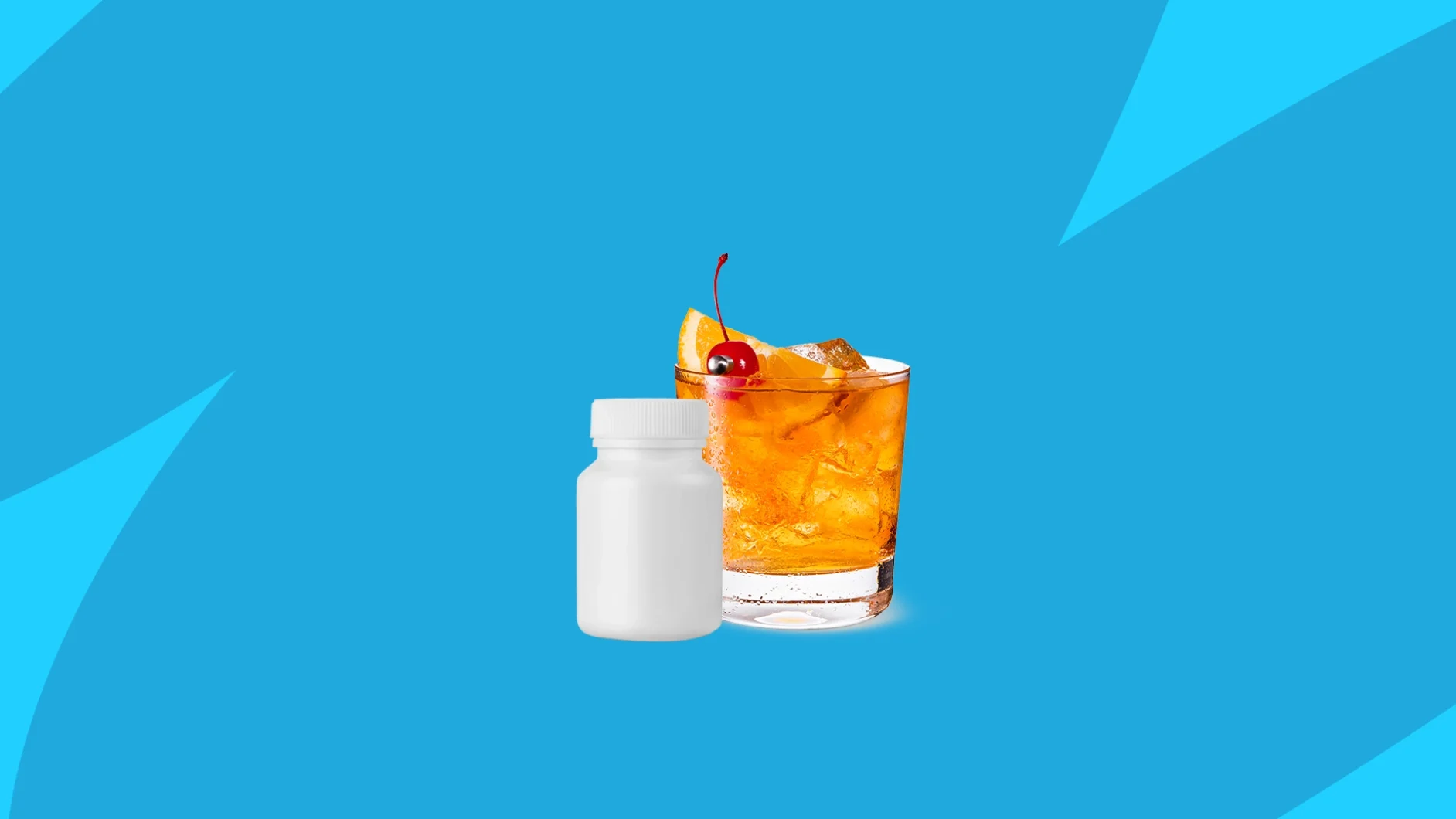Key takeaways
Mixing quetiapine with alcohol can compound the side effects of both substances, increasing drowsiness, impairing coordination, decreasing blood pressure, triggering indigestion, and causing weight gain.
Alcohol exacerbates symptoms of the mental health conditions that quetiapine treats, potentially decreasing the effectiveness of treatment.
It’s recommended to avoid alcohol during quetiapine treatment and consult a healthcare provider for guidance.
Quetiapine, commonly prescribed under the brand name Seroquel, is an atypical antipsychotic medication used to treat mental health conditions such as schizophrenia and bipolar disorder. This medication affects dopamine and serotonin receptors in the brain, which may help balance mood. Quetiapine is typically taken daily, on a long-term basis, to manage symptoms. If you’re planning a trip or RSVPing to a social event, you may be wondering—is it ever okay to have a drink or two while taking this medication? Both substances affect your brain, and mixing the two has risks—most commonly, increased sedative effects, such as drowsiness and dizziness. However, with heavy alcohol use, more serious, even life-threatening, side effects may occur.
Can you mix quetiapine and alcohol?
The FDA drug label for Seroquel (quetiapine) advises limiting alcohol consumption while taking the medication. Both substances can slow the central nervous system (CNS), and taking them together compounds these effects. Combining quetiapine and alcohol can cause increased sedation, impaired judgment, and decreased coordination—among other side effects.
On top of that, alcohol negatively affects the mental health disorders this medication is prescribed for, potentially decreasing the effectiveness of your treatment plan or worsening symptoms of schizophrenia and bipolar disorder. Additionally, people with these conditions are at higher risk of developing alcohol use disorder, making regularly drinking an even riskier proposition.
While it may be tempting to have one or two drinks when you’re on vacation or at a wedding, no amount of alcohol consumption is considered safe with this antipsychotic medication.

Common side effects of mixing quetiapine and alcohol
The common adverse effects of quetiapine overlap with the common side effects of alcohol. Combining the two can intensify these side effects:
- Drowsiness: Drowsiness is a common side effect when taking quetiapine alone that is amplified with alcohol consumption. You may feel more sedation than usual while taking quetiapine, especially after first starting treatment. Drinking alcohol on quetiapine may make it difficult to do tasks that require alertness, such as driving or operating machinery.
- Dizziness: Mixing alcohol with quetiapine may also lead to increased feelings of dizziness that affect your balance. This can increase the risk of falls and other accidents due to impaired coordination.
- Blood pressure changes: Quetiapine and alcohol can each individually cause postural hypotension. Postural hypotension is a form of low blood pressure that happens when standing up from sitting or lying down. Combining quetiapine with alcohol may increase the risk of this problem, causing symptoms that include lightheadedness and fainting.
- Upset stomach: Indigestion and nausea are potential side effects of both quetiapine and alcohol. Quetiapine may trigger gastrointestinal problems like an upset stomach or nausea for some people. Likewise, alcohol can irritate the stomach lining, causing indigestion or nausea. When both substances are used together, these discomforts may intensify, increasing the chances of experiencing digestive issues.
- Weight gain: Quetiapine can cause increased appetite and caloric intake, leading to weight gain. Alcohol contains a lot of calories, and many people make unhealthy food choices while drinking. Therefore, the risk of weight gain may be higher in people who consume alcohol and take quetiapine.
Serious side effects of mixing quetiapine and alcohol
Many of the serious side effects of combining these two substances are worsened by regular, heavy drinking or alcohol abuse, such as:
- Increased heart rate: Combining quetiapine with alcohol can also lead to an increased heart rate, a condition known as tachycardia. Quetiapine alone can affect your heart’s rhythm, while alcohol can stimulate your heart to beat faster. When you mix the two, this effect can be amplified, causing your heart to work harder than it should, putting extra strain on the heart, and potentially leading to more serious heart-related issues.
- Blood sugar changes: Chronic alcohol use is linked to an increased risk of Type 2 diabetes. Quetiapine is known to increase blood sugar levels in some people. As a result, there is a potential risk of dangerously high blood sugar levels when mixing quetiapine and alcohol, especially due to the high sugar content found in many alcoholic beverages.
- Abnormal liver function: Alcohol can cause liver damage over time, and the addition of quetiapine may worsen this effect. Signs of liver stress or damage include elevated liver enzymes found through blood tests, which can indicate liver inflammation or lasting damage. In rare cases, quetiapine has been reported to cause acute liver failure, which is life-threatening.
- High cholesterol: Heavy alcohol use and quetiapine can independently affect lipid profiles by increasing the levels of low-density lipoprotein (LDL) cholesterol and triglycerides in the blood. If you drink alcohol and take quetiapine together, you might see an increase in cholesterol levels. High cholesterol may be a potential risk factor for heart disease.
If you or someone you know is abusing alcohol, it’s important to seek help. Addressing substance abuse may not only improve overall health but also improve the effectiveness of medications like quetiapine. When alcohol use is under control, the body can respond better to treatment, reducing the risk of harmful interactions and serious side effects.
How long after taking quetiapine can you drink alcohol?
You’ll want to wait around one day after the last dose of quetiapine before drinking any alcohol. Within the clinical dose range, quetiapine has an average half-life of about 6 hours, which means it takes roughly 6 hours for the body to reduce the drug’s levels by half. It can take around four to five half-lives to clear the medication from your body completely.
However, the exact time you should wait before drinking alcohol after taking quetiapine may vary based on several factors, including the dosage taken, your overall health, and how your body metabolizes the medication.
If you want to be extra cautious, you can wait several days and ensure that your body has fully eliminated the medication. Always consult a healthcare professional when considering alcohol use after taking quetiapine.
Are any atypical antipsychotics safe with alcohol?
Mixing alcohol with atypical antipsychotics typically isn’t safe. Like antidepressants and many other psychotropic drugs, atypical antipsychotics may cause drowsiness, which may be increased with alcohol. Therefore, these medications can have potential interactions with alcohol that can increase sedative side effects.
Common antipsychotics other than quetiapine that can interact with alcohol include:
- Abilify (aripiprazole)
- Zyprexa (olanzapine)
- Risperdal (risperidone)
- Clozaril (clozapine)
If you take any atypical antipsychotics, you’ll want to refrain from drinking any alcohol. Discuss potential treatment options with a healthcare provider if drinking is a concern for you.
Are any other mental health medications safe with alcohol?
Typically, drinking alcohol counteracts the effects of mental health medications and increases the risk of side effects. Because of this, most mental health medications are unsafe to combine with alcohol.
The bottom line: Don’t mix quetiapine and alcohol
Mixing quetiapine and alcohol can lead to excessive sleepiness and impaired coordination, increasing your risk of accidents and injuries. Quetiapine and alcohol also have overlapping effects on blood sugar levels, weight gain, and liver functions. It’s recommended to avoid drinking any alcohol during treatment with quetiapine and to consult a healthcare provider for any concerns regarding mixing the two substances.
Sources
- Seroquel XR highlights of prescribing information, U.S. Food and Drug Administration (2020)
- Bipolar disorder and alcoholism, Alcohol Research & Health (2002)
- Co-occurring alcohol use disorder and schizophrenia, Alcohol Research & Health (2002)
- Withdrawal syndrome after antipsychotics discontinuation: an analysis of the WHO database of spontaneous reports (Vigibase) between 2000 and 2022, Psychopharmacology (2024)
- Explaining excessive weight gain during early recovery from addiction, Substance Use & Misuse (2020)
- Combination of alcohol and glucose consumption as a risk to induce reactive hypoglycemia, Journal of Diabetes Investigation (2021)
- Quetiapine, ScienceDirect (2024)
- Half life, StatPearls (2023)



